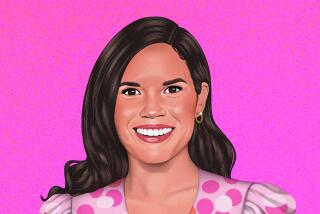
Recently, the National Hispanic Foundation for the Arts found itself in hot water for failing to include Colman Domingo in a tweet congratulating actress America Ferrera and, erroneously, singer Becky G on their recent Oscars noms (“The Fire Inside” from the film “Flamin’ Hot” was nominated for original song, but not Becky G herself). Critics argued that overlooking Domingo, a Black actor whose father is from Belize and whose family is from Guatemala, was yet another egregious example of Afro Latino erasure.
More bad news was on the way. It turned out that none of these people were Latino in the first place. At least, according to Argentinian actor Juan Caruso of “Society of the Snow” fame, a Netflix movie with a Latin American cast that also happens to be Spain’s Oscar entry for international feature film. To a post congratulating Ferrera and Domingo for representing Latinos at the Oscars, Caruso coyly replied, “Latinos where?” His response currently touts over 69,000 likes.
An exploration of marketing terms like ‘200%’ and how that’s shaped our identity.
We yanquis might find this confusing: How could a white, blue-eyed actor so comfortably dismiss the identities of Ferrera and Domingo?
But as someone who has had their neural network ripped to shreds like pernil by social media, I’ve come across this sentiment many times, and frankly I think it’s worth grappling with. Does being Latino come down to your place of birth?
So-called “diaspora wars” are nothing new on the internet, with mudslinging coming from all directions. But Caruso articulates a view on Latino identity here that’s radical in its scope. It rejects the idea of a diaspora altogether, confidently asserting that what defines Latinidad is the country you were born in.
That’s not to say Caruso wasn’t met with pushback. Some called attention to his history of tweeting racial slurs, others to the history of Argentina itself, known to have a sizable community of people with German heritage. A few of these individuals arrived in the country shortly after World War II for, I’m sure, entirely benign reasons.
But neither of these things contradict his underlying argument, which does at least provide a clear-cut answer to the Gordian Knot at the center of Latinidad: What is it? Is it where you’re from? Is it a phenotype? Is it the language you speak? Your ancestors? Some ineffable X factor that transcends all of the above?
According to a recent analysis from Pew Research, 78% of U.S. Hispanics say it is not necessary to speak Spanish in order to be considered Hispanic. Within the group of Latinos who don’t speak Spanish, however, 54% say they have been shamed because of it.
Caruso and those who agree with him offer a neat, tidy appeal to nationalism. At least, they put faith in some core premises of national projects, which aim to inspire in a group of people a sense of commonality and shared history. This stringent definition of “Latino” insists that only those born within the region have a claim to the title. It’s only there, in that land, that the essence of being Latin lives, and can be bestowed on an individual after being steeped in it for some undisclosed amount of time.
I must confess, as someone who engages in mandatory hedging around defining Latinidad, the contrarian in me is titillated by this unabashed endorsement of the Latino monolith theory: Yes, all these different countries do have something in common, and that “something” is so strong and self-evident that we can confidently draw the lines where its phenomenon begins and ends, which is right below Texas.
While it might look bad for Caruso to dismiss Ferrera and Domingo as he did, supporters of his view could argue that, actually, it’s people in the U.S. who are racist for assuming that any vaguely beige or brown person with a Spanish-sounding last name is Latino. Their proposed model, meanwhile, has nothing to do with race.
There are some valid critiques in there. Popular U.S. modes of thinking often conflate race and ethnicity, which can lead to silliness. An example that springs to mind is Variety calling actress Anya Taylor-Joy, who grew up in Argentina, a “woman of color” in an article about her winning the Golden Globe for her role in “The Queen’s Gambit.” Such high-profile blunders elicit the perennial reminder: “Latino is not a race.”
But I have questions.
Latino history in the U.S. is chronically under-covered in schools, according to a report from the Johns Hopkins Institute for Education Policy and UnidosUS, an advocacy organization.
Borders, for one thing, are temporary fictions. The nations they give shape to hold a plethora of experiences, backgrounds and cultures within, often including unwilling participants, such as Indigenous populations, people who trouble the assumption that any geopolitical configuration can contain a distillable essence. Another assumption is that an appeal to nationalism or, more nebulously, to a continent, is race-neutral.
Ethnicity is not race. But race, like ethnicity, is a fluid concept. It relies on a host of assumptions contingent on regional and cultural contexts. It’s a way to categorize people and arrange them into hierarchies, a way to disenfranchise some for the benefit of others. The way Latin America took shape, the way it exists today, is intimately tied to this legacy.
The unholy marriage of race and nationalism prompted an essay I often return to. Titled “Blood and Soil” and published in Nature Journal in 1938, its author(s) fiercely criticized and rejected Nazi Germany’s efforts to merge land with a spiritual and biological essence. “The history of mankind is largely a story of the conflict of man’s ideals,” the essay opens. “Or, as the cynic would say, of his illusions.”
One of those ideals is that of a “Latin race,” dreamt up by French economist Michel Chevalier, who conceived it to distinguish between two sorts of colonists in the Americas: those of Anglo-Saxon heritage and those of Latin heritage (Spanish, French, and Portuguese). These Latins in America, he argued, could ally themselves with Latin Europe against the British. Napoleon III would later emphasize this link as one of the pretenses for his invasion of Mexico.
Get the Latinx Files newsletter
Stories that capture the multitudes within the American Latinx community.
You may occasionally receive promotional content from the Los Angeles Times.
There’s also evidence that some Central and South Americans used the term as a way to push back against North American aggression. In 1845, Chilean writer and thinker Francisco Bilbao proposed a “Latin America” that incorporated much of South America, though not Brazil, to act as a counterbalance against North America, which included Mexico.
Far from being an inarguable timeless truth, the term “Latin America” attracted intense opposition in 1918, with Dr. Jaurelio Espinosa, editor of the prominent magazine Hispania, dismissing it as “vague, meaningless, and unjust” and “unscientific.” I’m sorry he would invalidate your identity like that, Juan Caruso.
The point is, for all the criticisms about the blundering conflation between race and ethnicity, the word “Latino” is not neutral about either of these, and the idea that it speaks to a monoculture of some kind with clear borders is an extension of the fraught legacies established during the early colonial era. “Latino” is not a race, but it being an ethnicity doesn’t necessarily render it easier to configure. It is, like most human affairs, a fantasy reaching for truth.
And yet, at the same time, we can’t be blamed for becoming attached to these words and concepts. They anchor us to our experiences, help us make sense of them and allow us a way to move through the world in a logical, organized manner. Language and narrative are tools to that end. Without them, we’d be in chaos.
The history of the word “Latino” in the U.S. speaks to this. Something Caruso and I would likely agree with is that we use it differently here. “Latino,” while not a race, is nonetheless a racialized term in a society that associates it with an underclass, with impoverished people who do manual labor and live in barrios, people who, not so long ago in Texas, for example, weren’t allowed in the same restaurants as other citizens. The criteria used to identify these people touched on the hallmarks of racecraft: physical features, clothing style, language.
One artists exploration of what it means to grow up away from your homeland and family.
Is this a good system? Is it worth defending? Can it lead to absurdity, like the Anya Taylor-Joy article? All questions worth digging into, but quite separate from the core of the matter, which is that language, nations and identity are all ghosts with teeth, phantoms that aren’t real until they bite you and draw blood.
The descriptive powers of a word like “Latino” are whatever we decide them to be. So it’s interesting that, to many, those powers begin with European thinkers, but end before they reach a Black actor who speaks Spanish, has a father from Belize and a Guatemalan family.
Proponents of this concept have made it abundantly clear that Latinidad is not defined by language or customs — things that are transportable, things that immigrants can carry with them — but by the soil that greets your feet shortly after your birth.
If it were a matter of culture, then wouldn’t the children of recent immigrants, who’ve carved out ethnic enclaves in the U.S. where their languages are spoken and their traditions kept alive, qualify? What of the microcosms that have sprung up in border states, many of them housing people who don’t even speak English?
As for me, I can’t deny that the sentiment Caruso is championing hasn’t impacted me. I’m much more likely to call myself Chicano these days, because before I identify with an ethnicity, I identify as someone who can’t be bothered. And anyway, it’s not like there won’t be a new word in the future. “Hispanic” was all the rage in my abuelos’ time, which arrived to them courtesy of the Nixon administration, of all things.
It’s darkly comedic in a way. How dearly we cling to these words and concepts that were drawn up and ratified in rooms that the majority of our ancestors would not have been allowed in, or indeed, anywhere near. How precious we are about our illusions.
JP Brammer is a columnist, author, illustrator and content creator based in Brooklyn. He is the author of ”Hola Papi: How to Come Out in a Walmart Parking Lot and Other Life Lessons,” based on his successful advice column. He has written for outlets including the Guardian, NBC News and the Washington Post. He writes a weekly column for De Los.










